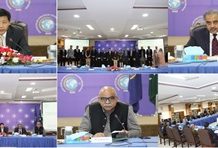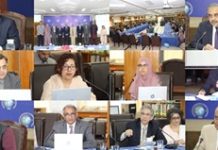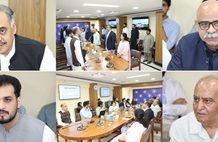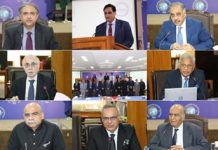Press Release
Panel Discussion on “Economic Security & Geo-Economics: Challenges & Opportunities for Pakistan
March 09, 2022
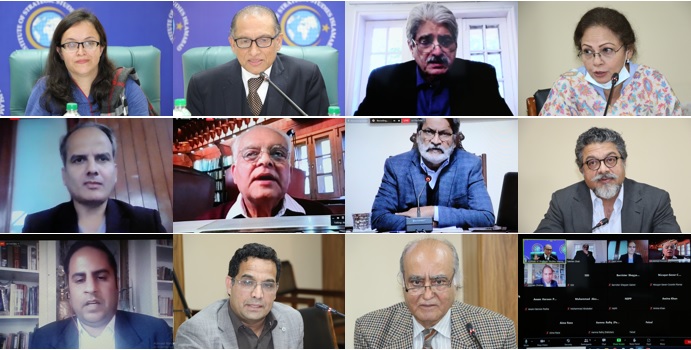
The Centre for Strategic Perspectives (CSP) at the Institute of Strategic Studies Islamabad (ISSI) organised a Panel Discussion on “Economic Security and Geo-Economics: Challenges and Opportunities for Pakistan”, on March 09, 2022. This event was conducted in the context of the 2nd Islamabad Security Dialogue (ISD 2022) which will be taking place under the rubric of National Security Division (NSD) of the Government of Pakistan in April next month.
Keynote speaker of the event was Dr. Salman Shah, former Finance Minister of Pakistan. Other esteemed panellists included: Dr. Aisha Ghaus Pasha, former Finance Minister of Pakistan; Dr. Sajid Amin, Research Fellow/ Founding Head Policy Solutions Lab, SDPI; Dr. Akmal Hussain, Distinguished Professor, Department of Economics, BNU, Lahore; Dr. Safdar Sohail, Dean, National Institute of Public Policy (NIPP), Lahore; Mr. Amer Zafar Durrani, Reenergia; Dr. Usman Chohan, Director, Economic Affairs & National Development, CASS; and Dr. Liaquat Shah, Executive Director, Centre of Excellence for CPEC.
In her introductory remarks Dr. Neelum Nigar, Director, CSP, welcomed the guests and said that under National Security Policy Framework (NSP), economic security and geo-economics have been given the primary focus in order to enhance regional connectivity and pave the path for all-encompassing development.
While in his welcome remarks Ambassador Aizaz Ahmad Chaudhry, Director General, ISSI, said that he is pleased that in the tripod of national security comprising traditional security, economic security and human security as highlighted in the NSP, is the economic security which has been given the primacy as any nation runs on the on the treasury that it has, and therefore this is the right approach. Therefore, it is encouraging that this topic has been primacy now.
In his keynote address, Dr. Salman Shah talked about the economics of this situation. He stated that new opportunities are presenting themselves with ample predictability in the prevailing geopolitical situation. He emphasized that Pakistan should be prepared to capitalise on these new economic opportunities. Pakistan can be a connecting hub for Central Asia, Western China all the way to the Indian Ocean.
Dr. Salman said that Chinese economy will be the driving force for us in this regard, hence, as a non-aligned partner, Pakistan should further bolster its economic relationship with China. And maybe with Central Asia and Russia, and also try to keep our channels with the Western world, because Pakistan could be the place where all these powers can meet. And if it can generate that kind of computation, that would be a very big success for Pakistan’s economics and also for its foreign policy.
Dr. Aisha Pasha in her remarks stated that in today’s world, a country’s strength is not in its military prowess alone but also in its economic strength & durability which determines its standing in the global community. She said that Pakistan has to go through a very painful transition in order to become a self reliant and resilient economy. Dr. Aisha emphasized that if Pakistan needs to implement concrete measures for economic solvency on emergency basis otherwise it will keep on becoming the collateral damage of the political games that are taking place globally.
Dr. Sajid Amin during his remarks said that Pakistan’s economists and policy makers need to ask the right questions about the country’s economy. Re-shift focus and priorities initiatives. He suggested to include the SME policy into Pakistan’s development policy and manage population. He said that Pakistan needs to shift its growth structure from consumption to investment, from imports to exports, and focus more on consolidating manufacturing base which is unfortunately bypassed by its services sector which is a not a highly productive sector.
Dr. Akmal Hussain in his remarks highlighted that Pakistan needs to completely change its framework of thinking with respect to economic policy. He said that so far, Pakistan’s economic policy has essentially been designed to generate incomes for a small coalition of elites which has led its institutional structure to systematically exclude the majority of the people from the process of economic growth. He suggested that Pakistan needs to create economic educational and research institutes and connect them with economic enterprises in order to bring innovation and economic agency to the people. Dr. Akmal also emphasized to build an economy that can produce knowledge intensive exports.
During his remarks, Dr. Safdar Sohail stated that policies are social in nature. He said that with regards to Pakistan’s economy, it is high time for self reflection. Pakistan needs to control the surge of conspicuous consumption, and stop emulating the practices of developed and advanced economies. Promotion of imported goods to the local population and creating value in their consumption is what needs to be controlled. Dr. Safdar suggested that Pakistan needs to see what forces are driving the conspicuous consumption and address the issues immediately.
Mr. Amer Zafar Durrani stated that Pakistan should prioritise in opening up to the region rather than closing down its borders for smooth transfer of people, goods and data. He said that this will help Pakistan in not only integrate and connect with the region, but also aid in regulation of things as well. Mr. Amer said that Pakistan is a natural corridor for transit trade and should harness this natural advantage to the maximum. Pakistan is located in a region where poor trade logistics have led to economic degradation of the entire region. All South Asian countries will gain from a more integrated region. He said that this region has vast untapped trade and investment possibilities. He suggested that South Asia needs to break the vicious cycle of conflicts, poor stability and bad intra-regional trading to a virtuous cycle of regional integration, growth and stability and trade and connectivity.
Dr. Usman Chohan during his presentation on the significance of industry and SEZs for Pakistan’s geo-economics stated that an industrial policy is a core element of a strong geo-economic strategy. Pakistan has missed several economic opportunities in the past and has many reforms to do. SEZs may or may not be the most ideal format to this end. Dr. Chohan concluded by stating that if a strong industrial policy is implemented, a strong industrial base will help ensure national economic sovereignty and development of Pakistan.
Dr. Liaquat Shah remarked that Pakistan has been making efforts to industrialise over time. Industrialization is not a short but rather a lengthy and a time consuming process. He stated that Pakistan has accumulated a vast wealth of knowledge in this regard, combined with institutions and industrial states along with numerous Chambers of Commerce across the country. He said that Pakistan has an economic ecosystem in place. He emphasized that the main problem lies in the social coordination in Pakistan which is a result of the existing social trust deficit. He suggested that the environment needs to be made fair for building this trust.
In the end, Ambassador Khalid Mahmood, Chairman BOG ISSI concluded the panel discussion emphasized on the importance of having a strong economic base for Pakistan which will ultimately improve its stature internationally and strengthen its foreign policy. Ambassador Khalid then went on to present his vote of thanks to all the esteemed panellists and participants.




